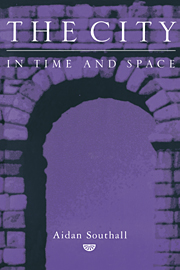Book contents
- Frontmatter
- Contents
- List of illustrations
- Acknowledgements
- Introduction
- 1 ‘Writing the city under crisis’
- 2 Pristine cities
- 3 Greece and Rome
- 4 Cities of the Feudal mode of production in Europe
- 5 Asian cities: Asiatic and Feudal modes of production
- 6 From colonial to Third World cities
- 7 The transformation of the city: from the Feudal to the Capitalist mode of production and on to the apocalypse
- Notes
- References
- Index
7 - The transformation of the city: from the Feudal to the Capitalist mode of production and on to the apocalypse
Published online by Cambridge University Press: 10 December 2009
- Frontmatter
- Contents
- List of illustrations
- Acknowledgements
- Introduction
- 1 ‘Writing the city under crisis’
- 2 Pristine cities
- 3 Greece and Rome
- 4 Cities of the Feudal mode of production in Europe
- 5 Asian cities: Asiatic and Feudal modes of production
- 6 From colonial to Third World cities
- 7 The transformation of the city: from the Feudal to the Capitalist mode of production and on to the apocalypse
- Notes
- References
- Index
Summary
Chapter 7 traces the process of transformation to the Capitalist mode of production, the pitiless tyranny of the formation of capitalist labour, the factors favouring the transformation in European cities, particularly in Britain, culminating in spectacular take-off at Manchester. It shows the special place of London, the horrors of the slums and the eventual outbursts of civic pride, the reform of urban government, flowering of the bourgeoisie and hazardous progress of the working class. It portrays the urban network in Britain and post-war urban rebuilding. Paris and its history are searched and sketched for the sources of urban charm and its modern travails, the drama of the Paris Commune and the Sacré Cœur, the failures and successes in housing the urban poor in post- World War II Paris. The cultural continuity and post-war reconstruction of German cities are illustrated. Urbanization in the United States is traced from the colonial to the industrial cities, the immigrant flood to the cities, the westward expansion of cities and railways, the failure of industrial slavery; the inter-relations of urban transport, technology and class; immigrants and bossrule, the ubiquity of violence and corruption, extreme wealth and exponential city growth. The post-World War I city scene of boom and stubborn depression is delineated, the post-World War II baby-boom and prolonged prosperity; the urban strategies of employers and workers, the dialectics of mass Black urban migration, the automobile age, ghettos and suburbs, the unfolding dynamics of suburban life, ethnicity and class, the farce of urban renewal and the difficulties of small towns. The penetration of the media is emphasized, the revolt of urban youth, social and sexual conventions overturned.
- Type
- Chapter
- Information
- The City in Time and Space , pp. 306 - 419Publisher: Cambridge University PressPrint publication year: 1998



